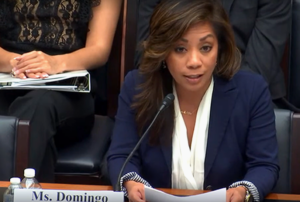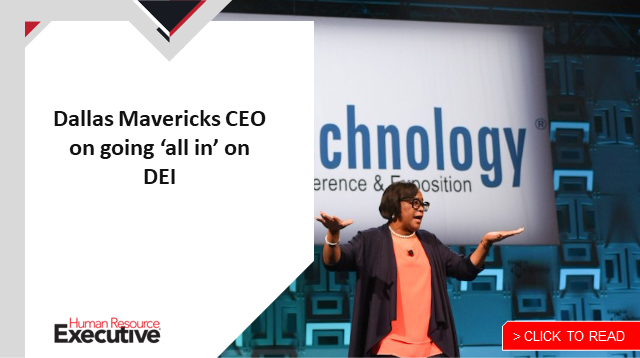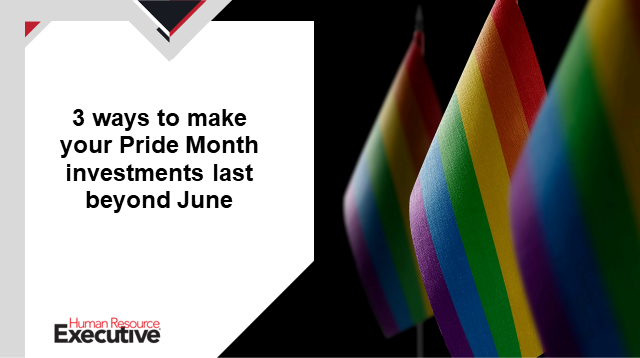When Eloiza Domingo’s parents came to the United States from the Philippines, they were in search of the “American Dream” for their family. Fifty years later, that journey culminated in their daughter heading to the nation’s capital to testify in front of Congress.
The discrimination Domingo’s parents faced as they established careers as physicians in the U.S. is part of what drove her to dedicate her own career to DE&I work, fighting for those who are “othered.” It’s a mission that, doubtlessly, wasn’t far from her mind when she represented Allstate—where she serves as vice president of HR and chief inclusive diversity & equity officer—in front of the House Financial Services Subcommittee on Diversity and Inclusion in September. The insurance giant was the only private company that testified during the session on the state of DE&I work at the nation’s largest insurance companies.

It was a move that went hand in hand with Allstate’s commitment to data-driven transparency around DE&I, says Domingo, who has also held DE&I leadership roles at Astellas Pharma, Johns Hopkins Medicine and Cincinnati Children’s Hospital Medical Center. On Capital Hill, she shared Allstate’s major wins on DE&I—such as hitting its 2022 representation goals two-thirds of the way through the year—as well as areas where improvement is needed.
“We testified about things we’re doing well as well as things that haven’t gone as well,” she says. “It was a huge accomplishment for us but also it was a way for us to hold ourselves accountable. When you believe in diversity and in what you’re doing, you have to lean into the hard conversations and be very public about it.”
Domingo recently shared with HRE how the company is doing that.
HRE: What attracted you to DE&I work?
Domingo: My parents immigrated from the Philippines in the 1970s to pursue what they believed was the “American Dream.” I don’t know if I would have gone into this work had my parents not come to America. They worked very hard; they both are physicians and were discriminated against a lot because of their accents. I watched that happen and remember thinking, “That’s not fair.” That’s where a lot of my passion comes from. And as I grew older, I realized that this was more than just my parents. There are so many other people, other communities who need to have opportunities to talk, to be understood. As I got into my education, I really looked at the theories and practices of this work, and I had to create my own academic route; you would go to medical school to become a doctor or study physical therapy to become a physical therapist but there was no place to do this [academic DE&I work]. I got connected to mentors and sponsors who helped point me in this direction, and I know now that this is what I am supposed to be doing.
HRE: In what areas of the DE&I space has Allstate been the most innovative in the last few years?
 Domingo: In 2020, we had one of the largest bond deals we’ve ever seen. We issued a $1.2 billion bond using primarily minority-, women- and veteran-owned firms. It was the first time a company like ours had ever done that, engaging those types of minority-owned firms for this large of a bond. Correlative to that, we saw other companies following us; there was a 300% increase in companies using minority-owned firms for these types of bond deals but we were the first out of the gate. The even more impressive thing is that other companies started seeing this as not a risk but an investment as they move to continue to support those organizations and smaller businesses; and that, in turn, helps reverse the wealth gap in the U.S.
Domingo: In 2020, we had one of the largest bond deals we’ve ever seen. We issued a $1.2 billion bond using primarily minority-, women- and veteran-owned firms. It was the first time a company like ours had ever done that, engaging those types of minority-owned firms for this large of a bond. Correlative to that, we saw other companies following us; there was a 300% increase in companies using minority-owned firms for these types of bond deals but we were the first out of the gate. The even more impressive thing is that other companies started seeing this as not a risk but an investment as they move to continue to support those organizations and smaller businesses; and that, in turn, helps reverse the wealth gap in the U.S.
We’re also a major player in supplier diversity. Since 2004, we’ve tripled our annual spend to currently $5.3 billion. We’ve always been a major player when it comes to putting our money where our mouth is, and we hope to continue to improve over time.
HRE: Where do you think there’s the most room for growth and improvement when it comes to advancing DE&I goals across the company?
Domingo: What we want to keep working on is representation. We have great diverse representation now—71% of our overall population identifies as racially, ethnically or gender diverse, including 47% as people of color and 57% women. Those are great numbers but we need to do better in our leadership positions. Our diversity hiring numbers are the highest they’ve been actually ever; we’re hiring and bringing in more diverse candidates than what the market suggests, which is outstanding. But much of our diverse representation is at the manager level and below so, for directors and above, we need to do better. We want to mirror the communities we live, work and serve in, and that’s why we have accountability scorecards that we look at monthly to support behavior change. That way, we hold ourselves accountable and can be realistic about what we’re doing right and what we’re doing wrong and where we can create more educational opportunities and access points. And slowly but surely, every month we’re creating great improvements.
HRE: What role are data and/or emerging technologies playing in the future of Allstate’s DE&I strategy?
Domingo: Huge. Access to good, reliable data is really, really important. Otherwise, if we’re looking at our monthly scorecards and need to understand the current environment, if we don’t have regular access to clean, reliable data, the entire strategy goes to the pot. Also, the field of diversity has historically been built on testimonials or stories—which is good, but diversity is no longer just the right thing to do. We don’t do it because it makes us feel good; we need to do it because it shifts consumer dollars by hundreds of thousands. It shifts the ability for us to retain and attract talent that is diverse and highly sought after. All of those things matter, and that’s where data comes into play.
HRE: How do DE&I and culture work together at Allstate?
Domingo: Culture is a separate, distinct thing from diversity, but both rely on one another. The culture at Allstate is one that relies on respecting one another, creating dignity and opportunities to be authentic with one another, agreeing to disagree, challenging and pushing one another to collaborate. How diversity fuses into that is that, if you are the “only”—the only person with an accent in a group, for example—are we making sure you feel connected, that you can bring your authentic self? If you identify as LGBTQ, do we create an environment where no matter who you love, you can bring that person to an Allstate event by your side and have no one question you? That’s how diversity fits into culture.
We do an engagement survey at least two times a year. It’s one thing to look at the data, but it’s another to striate it by diversity dimensions. For example, is there a difference between the men who say they’re engaged versus the women who say they’re engaged? Are women of color answering that question differently than women who identify as white? To striate further, what about women who identify as Black versus Asian versus Hispanic versus LGBTQ versus people with disabilities? How are different dimensions of diversity impacting the data? One thing we found is that engaging in our employee impact groups correlates with great retention, promotion and satisfaction rates, which is outstanding.
 HRE: Do you have a personal (or professional) resolution for the coming year?
HRE: Do you have a personal (or professional) resolution for the coming year?
Domingo: At Allstate, what we’re trying to do is make sure everybody, everywhere is integrating IDE into their daily behaviors, into the operations of the business. We want to empower and give charge to people on their own to say, “How can I do this better?” We have a motto: “Me, we, Allstate.” “Me” means, what are you doing? “We” is holding one another accountable, engaging your team. And “Allstate” is how are we all holding one another accountable, pushing Allstate to be better? So, 2023 is going to be about further integration of those goals.
Personally, I tend to want to do everything quickly, so I want to make sure to slow down a bit in 2023. We created a great foundation in 2022 so next year I want to do the work on the ground and say, “OK, we set our goals, we have our tools, now let’s get into the nitty-gritty.”

